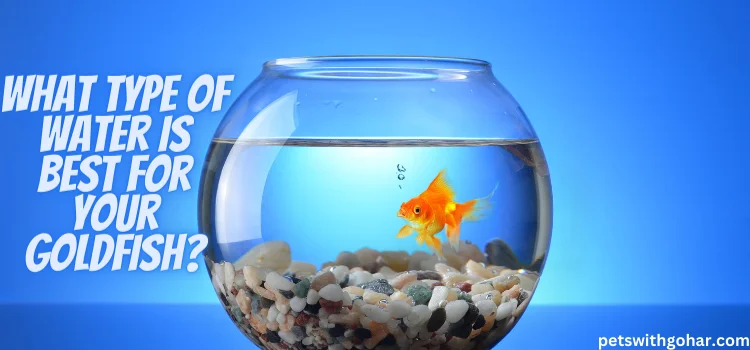The best water for your goldfish is trapped tap water with a stable temperature, pH, and hardness.
Ensuring a well-balanced aquatic environment is critical to goldfish health. Regular water testing and changes can help maintain optimal conditions.
Can You Boil Tap Water For Goldfish?

Yes, boiling tap water is one way to remove chlorine and make it safe for goldfish. However, it’s not the most efficient method and may not remove all harmful substances.
A better solution is to use a water conditioner specifically designed to neutralize chlorine, chloramines, and other potentially harmful substances in tap water.
Always ensure the water is at room temperature before adding it to the tank to avoid sudden temperature shocks to your fish.
Tap Water: A Common Choice
Tap water is the most readily available water source for many goldfish owners.
However, it’s essential to understand that tap water can contain chlorine, chloramine, and other harmful substances that can be toxic to your aquatic pets.
Before tap water, it must sit for at least 24 hours to allow the chlorine to dissipate.
Additionally, consider using a water conditioner to neutralize chlorine and chloramine. Regular testing of tap water for toxins is also advisable.
Reverse Osmosis Water: Pure and Stable
Reverse osmosis (RO) water is famous among serious goldfish keepers.
It undergoes a filtration process that removes impurities and contaminants, leaving behind pure H2O.
RO water offers a stable and clean environment for your goldfish. However, setting up an RO system can be time-consuming and costly.
RO water is an excellent option if you’re willing to invest in a premium water source.
Bottled Spring Water: Safe but Pricey
Bottled spring water, typically used for drinking, is considered safe for goldfish.
It is free from harmful chemicals found in tap water, and most brands maintain high-quality standards.
However, bottled spring water for your aquarium can be expensive, especially if you have a large tank.
Additionally, it’s essential to check the water’s pH levels, as bottled water may lack consistency.
Distilled Water: A Viable Choice with Care
Distilled water is another option, but it comes with a few considerations.
Since distillation removes all minerals, it lacks essential elements beneficial for your goldfish.
To use distilled water, you must add special mineral supplements to ensure your fish receives the necessary nutrients.
Moreover, the pH level of distilled water may be too acidic, requiring additional adjustments.
Specialized Aquarium Water: Suitability at a Cost
Several pet stores offer specialized aquarium water that is pre-treated and ready for use.
While this option provides convenience and ease of use, it can be more expensive than other alternatives.
Additionally, storing enough specialized water can be cumbersome if you have a large aquarium.
Factors to Consider When Choosing
Selecting the best water for your goldfish depends on several factors:
a) Cost
Consider your budget when deciding on a water source. Some options may be more affordable in the long run, while others can strain your finances.
b) Convenience
Convenience is crucial, especially if you have a busy schedule. Preparing certain types of water, like RO or distilled water, may require more time and effort.
c) Water Quality
Ultimately, the well-being of your goldfish depends on the water quality. Ensure the water source you choose meets the required standards for fish health.
How To Treat Tap Water For Goldfish.

To ensure the well-being of your goldfish, it is important to properly treat tap water. A water conditioner should be used for this purpose.
This product is specifically designed to neutralize harmful substances like chlorine and chloramines commonly found in tap water.
Follow the instructions on the conditioner’s packaging to determine the correct dosage. Once the conditioner is added, allow the water to reach room temperature before introducing it to your goldfish tank.
This gradual temperature adjustment helps prevent any potential harm caused by temperature shock.
Regular water testing is vital to maintain an optimal aquatic environment for your fish.
How Long Can Goldfish Survive In Tap Water?
Goldfish can survive in tap water for a few days to a week without treatment, but this is not ideal and can cause health complications.
If the tap water is treated with a conditioner to neutralize harmful substances and the pH, temperature, and hardness are closely monitored, goldfish can live healthily for many years.
Conclusion
Choosing the proper water for your goldfish is a critical decision that directly impacts their health and happiness.
Each water source has its pros and cons, so it’s essential to weigh the factors carefully. Tap water is a common choice but requires proper preparation, while RO water offers purity and stability at a higher cost.
Bottled spring water is safe but might be pricey, and distilled water can be a viable option with the right mineral supplements.
Consider your budget, time, and your goldfish’s well-being when making the final decision.
FAQs
Can I use untreated tap water for my goldfish?
It’s not recommended. Tap water often contains chlorine and other harmful substances that can harm your goldfish.
Let it sit for 24 hours and use a water conditioner before adding it to the tank.
Is RO water the best choice for all goldfish?
While RO water is pure and stable, it may not be necessary for all goldfish. Consider your specific fish’s needs and your budget before choosing this option.
How do I know if my goldfish is unhappy with the water quality?
Signs of distress in goldfish include lethargy, loss of appetite, and abnormal swimming behavior. Regularly monitor water parameters to ensure your fish’s well-being.
Can I mix different types of water for my goldfish?
It’s generally not advisable to mix different water types, as it can lead to unstable water conditions, which can stress your goldfish.
Are there any alternative water sources for goldfish?
Rainwater can be an alternative water source, but it requires proper collection and filtration to ensure it’s safe for your goldfish.
